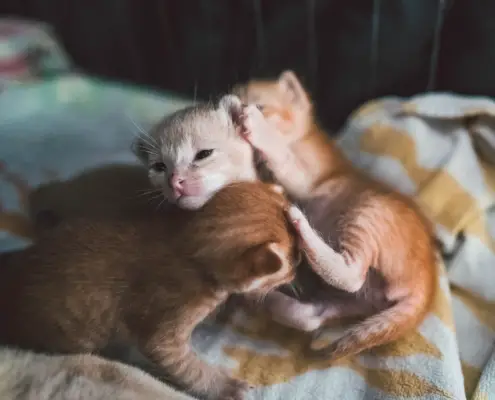
Cats have always been known for their independent and mysterious nature. However, a debate has been brewing among cat enthusiasts regarding the friendliness of female cats compared to their male counterparts. Some claim that female cats are inherently friendlier, while others argue that it is merely a stereotype. In this article, we will delve into the topic and uncover the truth behind these claims.
Understanding Cat Behavior: The Influence of Genetics and Hormones
To understand the friendliness of female and male cats, it is crucial to explore the factors that shape their behavior. Genetics and hormones play a significant role in determining a cat’s temperament. Female cats, for instance, possess two X chromosomes, which can influence their behavior. These chromosomes can carry certain genetic traits that may contribute to their perceived friendliness.
On the other hand, male cats have one X and one Y chromosome. The presence of the Y chromosome leads to the production of testosterone, a hormone that can affect a cat’s behavior. Testosterone often makes male cats more territorial and prone to aggressive behavior. However, it is important to note that these generalizations do not apply to all cats, as individual personalities can vary greatly.
Debunking the Stereotypes: Male Cat Personalities
Contrary to popular belief, male cats are not inherently less friendly than their female counterparts. While testosterone can influence their behavior, it does not necessarily make them unfriendly. Many male cats are affectionate, loving, and enjoy human company. It is vital to remember that each cat has its unique personality, regardless of gender.
Male cats can be loving companions and form strong bonds with their owners. They often enjoy playtime and cuddling, making them just as capable of displaying friendliness as female cats. Stereotyping male cats as unfriendly or aggressive overlooks the individuality of each feline and perpetuates unfair assumptions.
Debunking the Stereotypes: Female Cat Personalities
Similarly, the notion that all female cats are inherently friendlier is also a stereotype that needs debunking. While some female cats may exhibit more friendliness due to their genetic makeup, it is not a universal truth. Female cats can also display independent and aloof behavior, much like their male counterparts.
Like male cats, female cats have distinct personalities that are shaped by a combination of genetics, socialization, and their environment. It is essential to approach each cat as an individual and not make assumptions based solely on their gender. By recognizing and appreciating the unique personality traits of each cat, we can better understand their behavior and provide appropriate care.
Factors That Influence a Cat’s Friendliness: Socialization and Environment
While genetics and hormones play a role in a cat’s behavior, socialization and environment are equally important factors that contribute to their friendliness. Cats that are exposed to positive experiences and interactions with humans and other animals from an early age are more likely to develop friendly and sociable personalities.
A cat’s environment also plays a significant role in shaping their behavior. A loving and nurturing home with ample opportunities for play, social interaction, and mental stimulation can foster a friendly and affectionate cat, regardless of their gender. Conversely, a stressful or neglectful environment may lead to anxious or withdrawn behavior.
Research Studies on Cat Behavior: Do Female Cats Exhibit Friendlier Behavior?
Several research studies have been conducted to explore the behavior of female cats and determine if they exhibit friendlier behavior compared to males. One study published in the Journal of Applied Animal Welfare Science found that female cats tend to be more affectionate and initiate more social interactions with humans than their male counterparts. However, it is important to note that these findings are not universally applicable to all cats.
The study also highlighted that individual differences within each gender group were more significant than the differences between genders. This emphasizes the importance of considering each cat’s unique personality and not relying solely on generalizations based on gender. It is crucial to approach each cat with an open mind and allow their individual traits to shine through.
Research Studies on Cat Behavior: Do Male Cats Exhibit Friendlier Behavior?
While research studies have focused on the behavior of female cats, there is limited scientific evidence specifically addressing the friendliness of male cats. However, anecdotal evidence from cat owners suggests that many male cats are equally capable of displaying friendliness and affection.
Male cats can form deep bonds with their owners and exhibit loving behavior. They may engage in playful activities, enjoy lap time, and seek companionship. The key takeaway is that each cat, regardless of gender, has its own unique personality, and generalizations should be avoided.
Personal Experiences: Stories from Cat Owners on the Friendliness of Their Male and Female Cats
To gain a comprehensive understanding of the friendliness of male and female cats, it is valuable to hear from cat owners themselves. Many cat owners report having both friendly male and female cats, proving that gender does not solely determine a cat’s friendliness.
Some owners share heartwarming stories of their male cats showering them with affection, while others describe their female cats as loving and gentle companions. Each story highlights the unique bond between a cat and their owner, emphasizing the individuality of feline personalities.
Tips for Bonding with Your Cat: Regardless of Gender
Regardless of whether you have a male or female cat, establishing a strong bond with your feline companion is essential. Here are some tips to help you build a loving relationship with your cat:
- Spend quality time together: Engage in interactive play sessions, grooming, and cuddle time to strengthen the bond between you and your cat.
- Provide a stimulating environment: Enrich your cat’s environment with toys, scratching posts, and climbing structures to keep them mentally and physically engaged.
- Use positive reinforcement: Reward your cat with treats and praise when they display friendly behavior, reinforcing positive interactions.
- Respect their boundaries: Cats are naturally independent creatures, so it is crucial to respect their need for personal space and not force interactions.
- Be patient and understanding: Building trust takes time, especially with shy or reserved cats. Patience, understanding, and a gentle approach can go a long way in fostering a loving bond.
Debunking the Myth and Embracing the Uniqueness of Each Cat’s Personality
The debate over whether female cats are friendlier than male cats is not one that can be definitively settled. Both genders are capable of displaying affection, love, and friendliness. Stereotyping cats based on gender overlooks their individuality and unique personalities.
Instead of focusing on gender, it is important to approach each cat as an individual and appreciate their unique traits. By providing a loving and nurturing environment, engaging in positive interactions, and understanding their boundaries, you can build a strong and loving bond with your feline companion, regardless of their gender.
So, let’s put aside the myths and stereotypes and celebrate the diversity of cat personalities. Whether you have a male or female cat, cherish their individuality and embrace the joy that comes from the unique bond you share with your furry friend.
If you enjoyed my article, I would appreciate you sharing it with your network.

Sima Ndlebe
Sima writes for CatBuzz. He is interested in Cats, Health and Fitness, and Entrepreneurship.
Published: 7 June 2024



